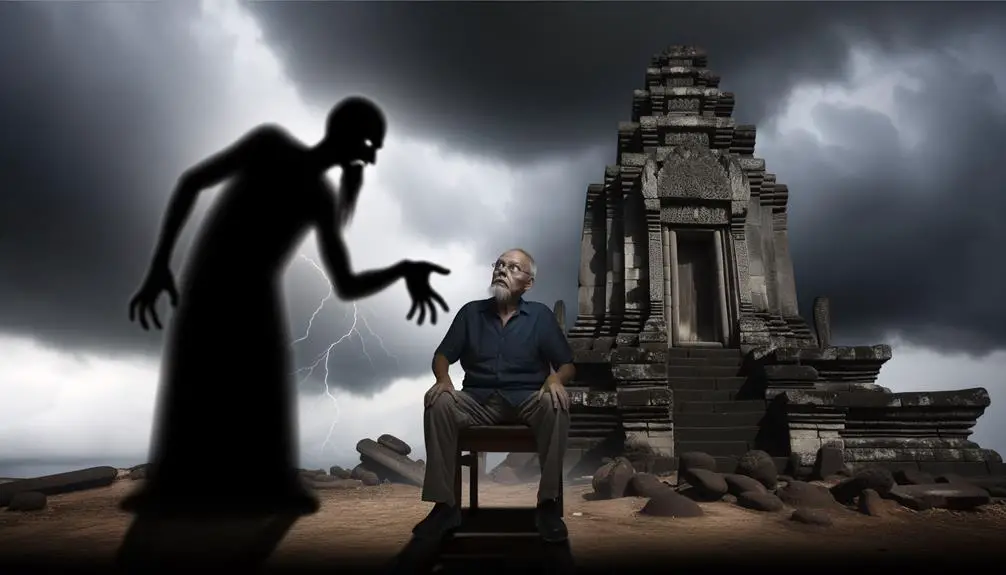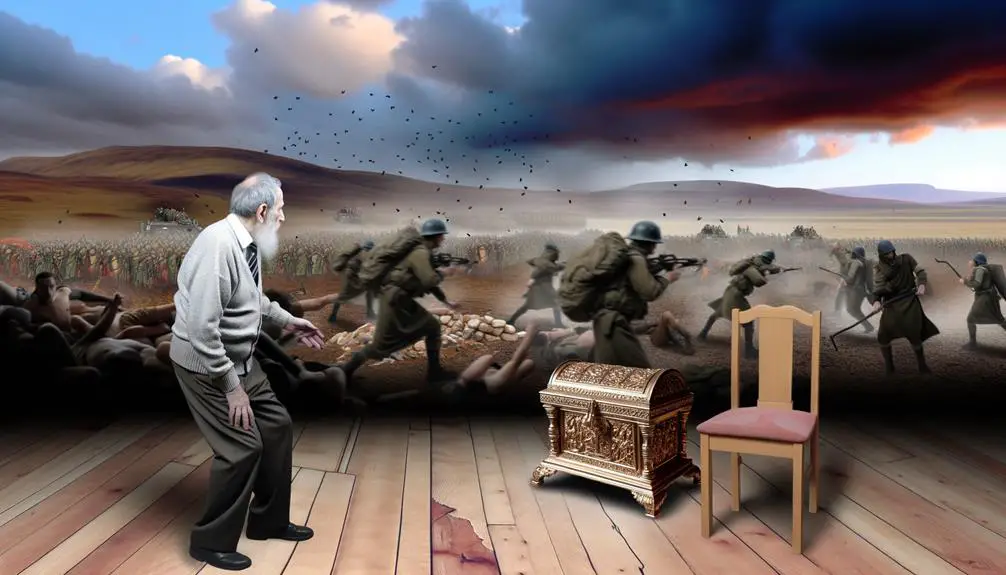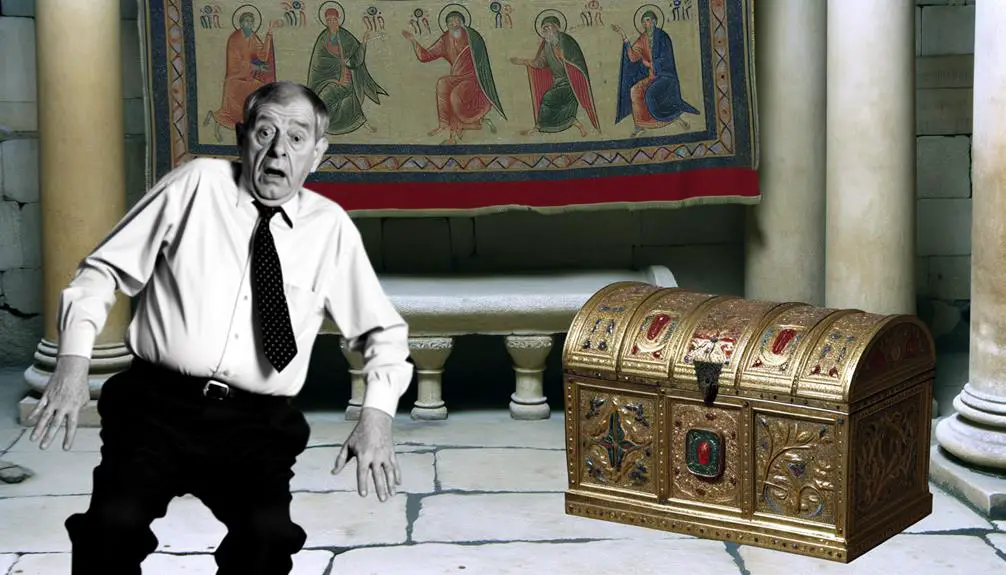The biblical Eli met his end in shock and tragedy upon hearing the Ark's fate, a moment that forever marked Israel's history.

How Did Eli in the Bible Die
Eli's life was a tapestry woven with devotion and tragedy, marking his tenure as a judge and priest in Israel. You might recall his pivotal role in mentoring the prophet Samuel, but it's his demise that often captures your imagination.
Orchestrated by a series of divine warnings and compounded by his sons' transgressions, Eli's end came when the Ark of the Covenant fell into enemy hands. The news of this loss struck him like a thunderbolt, leading to a dramatic conclusion.
You'll find the details of his final moments not only poignant but also a rich ground for understanding the complexities of leadership and divine judgment.
Key Takeaways
- Eli died from falling backward off his chair and breaking his neck upon hearing the Ark's capture.
- His death symbolized divine judgment for his negligence and his sons' misconduct.
- The loss of the Ark and Eli's death indicated a spiritual and leadership crisis in Israel.
- Eli's demise prompted a period of national introspection and reflection on spiritual responsibilities.
Eli's Role and Responsibilities

Eli, serving as both high priest and judge, held a pivotal role in guiding the spiritual and judicial aspects of Israelite society. His responsibilities were immense, stretching far beyond the confines of the Tabernacle. As a high priest, Eli donned the priestly garments, symbols of his consecration and dedication to serving God and the community. These garments weren't just attire but embodied the sanctity of his office, representing a bridge between the divine and the Israelites.
In his capacity, Eli's spiritual leadership wasn't just ceremonial. He offered sacrifices, led worship, and was tasked with upholding the laws handed down through Moses. This role made him a central figure in the religious life of the nation, bearing the weight of maintaining purity and adherence to God's commandments. Moreover, his position as a judge meant he also wielded considerable influence over the secular affairs of the people. He adjudicated disputes, imparted wisdom, and enforced the laws that governed daily life, ensuring justice and fairness within the community.
Eli's dual role underscored his significance in a society where religion and governance were deeply intertwined. His actions and decisions had lasting impacts, shaping the moral and spiritual fabric of the Israelites. Through his leadership, Eli endeavored to steer the people towards faithfulness and obedience to God, embodying the ideals of both a spiritual guide and a judicial authority. However, the challenges he faced in these roles also highlight the complexities of leadership and the high standards to which leaders were held in ancient Israelite society.
The Prophecy of Doom

A pivotal moment in Eli's narrative comes with the delivery of a divine prophecy, foretelling the downfall of his lineage and the severe consequences for his failure to rein in the sacrilegious actions of his sons. This proclamation of divine judgment isn't merely a warning but a stark declaration of prophetic fulfillment that becomes a central element in understanding the broader implications of Eli's leadership and its eventual tragic outcome.
The prophecy delivered to Eli carries profound implications:
- Imminent demise of his lineage: It signals an end to his family's priestly lineage, marking a significant shift in the religious leadership of Israel. This transition underlines the gravity of divine judgment and its lasting impact on familial legacies.
- Divine retribution for negligence: The prophecy emphasizes the consequences of Eli's failure to address his sons' misconduct. This divine judgment serves as a cautionary tale about the responsibilities of spiritual leaders to uphold righteousness.
- A shift in priestly lineage: The eventual fulfillment of this prophecy not only affects Eli and his immediate family but also heralds a broader change within the religious hierarchy. It signifies a divine intervention in redirecting the course of spiritual leadership.
This moment of prophetic declaration underscores a critical aspect of biblical narratives: the intertwining of personal accountability with divine will. As you delve deeper into Eli's story, the unfolding of this prophecy highlights the intricate balance between divine judgment and the consequences of human actions, shaping the course of biblical history through its fulfillment.
His Sons' Wickedness

The wickedness of Eli's sons, Hophni and Phinehas, stands as a stark testament to their disregard for sacred duties and the overarching consequences of their actions on the spiritual integrity of Israel. These two, positioned as priests, engaged in acts that directly contravened the laws and ethical codes they were supposed to uphold. Their egregious misconduct included taking for themselves the best portions of sacrifices and engaging in immoral activities at the sanctuary, a place meant for divine worship and communal sanctity.
This behavior not only reflected a personal failure but also highlighted a significant lapse in parental guidance and spiritual oversight. Eli, despite being aware of his sons' actions, failed to adequately reprimand or restrain them, an inaction that ultimately contributed to the degradation of the priesthood's moral and spiritual authority. This lack of decisive intervention serves as a critical reflection on the importance of strong parental guidance and the need for spiritual leaders to uphold not just personal integrity but also to ensure the sanctity of their office through active oversight and correction of those under their charge.
The narrative underscores a broader thematic concern within the sacred texts about leadership, responsibility, and the consequences of neglecting one's duty to both family and faith community. Eli's inability to correct his sons' behavior not only led to their downfall but also precipitated a divine judgment against his lineage, emphasizing the interconnectedness of personal ethics, family dynamics, and communal welfare within the spiritual economy of Israel.
The Ark's Capture

Following Eli's failure to address his sons' misconduct, Israel's spiritual decline culminated in the capture of the Ark of the Covenant by the Philistines, marking a pivotal moment of crisis and reflection for the nation. This event wasn't just a military defeat; it represented a profound spiritual loss, revealing the extent of Israel's estrangement from their covenant with God. The Ark's significance as the physical manifestation of God's presence among His people meant its capture wasn't only a political disaster but a theological crisis as well.
The Ark's significance was multifaceted; it was seen as a tangible embodiment of God's presence and favor. Its loss signaled a profound spiritual defeat and a rupture in the perceived relationship between God and Israel.
The battle's aftermath was devastating, leading to a significant loss of life among the Israelites, including Eli's sons, Hophni and Phinehas. The defeat underscored the consequences of Israel's spiritual waywardness and the failure of its leadership.
The capture of the Ark prompted a period of national introspection. It forced the Israelites to confront the reality of their departure from God's laws and the dire consequences of their actions.
Analyzing the capture of the Ark within the broader narrative of Eli's tenure as judge reveals a narrative of decline, where disregard for divine commandments leads to national catastrophe. The event serves as a critical juncture in the biblical chronicle, illustrating the tangible consequences of spiritual negligence and the importance of faithful adherence to divine law.
The Fall and Death

Eli's demise, marked by a tragic fall and death, epitomizes the culmination of Israel's spiritual and leadership crisis during his tenure as judge. When you learn of Eli's end, it's crucial to understand the shock impact and spiritual significance that underscored this moment. At 98, blind and heavy, Eli's physical state mirrored the spiritual decay and heavy burden of Israel's sins. His fall and subsequent death upon hearing the Ark of God had been captured not only marked a personal tragedy but also symbolized the profound spiritual downfall of Israel.
Aspect |
Significance |
|---|---|
Eli's Physical Fall |
Represents Israel's spiritual collapse |
Shock Impact |
Demonstrates the profound effect of the Ark's loss |
Eli's Death |
Marks the end of an era in Israel's history |
Spiritual Significance |
Highlights the need for renewal and divine guidance |
Eli's reaction to the news of the Ark's capture and his sons' deaths—falling backward off his chair, breaking his neck, and dying—serves as a pivotal moment. You'll notice this wasn't merely an accident; it was laden with divine irony and judgment. The shock impact of the Ark's capture, coupled with the loss of his sons, underscores the severe consequences of neglecting one's duties to God and the community.
The spiritual significance of Eli's fall and death transcends the historical account, offering a somber reflection on leadership, responsibility, and the devastating effects of spiritual negligence. As you delve deeper into this narrative, it's evident that Eli's end was more than a personal tragedy—it was a divine indictment on Israel's spiritual state, prompting a period of reflection and eventual renewal.
Frequently Asked Questions
How Did the Community of Israel React to Eli's Death, and What Immediate Impact Did It Have on Their Society and Religious Practices?
After Eli's death, you'd observe Israel plunged into chaos, facing immediate military consequences and a political vacuum. This sudden loss rocked their society and religious practices, significantly altering their national identity and cohesion.
As you analyze, it becomes evident that Eli's passing wasn't just a personal tragedy but a critical turning point, prompting a reevaluation of leadership and divine favor, deeply influencing the communal and spiritual trajectory of Israel.
Are There Any Archaeological or Historical Evidences That Corroborate the Biblical Account of Eli's Life and Death?
You're diving into whether there's any archaeological or historical evidence to back up the biblical story of Eli. When it comes to finding Eli's artifacts or securing historical validation, you're entering a realm where tangible proof is scarce.
Scholars and archaeologists haven't unearthed direct evidence that conclusively corroborates Eli's life and death. This isn't unusual, as many ancient figures are known only through texts, with physical evidence remaining elusive.
How Has Eli Been Depicted in Art, Literature, and Film Throughout History, and What Variations Exist in These Portrayals?
You'll find Eli's iconography and dramatic adaptations vary widely across art, literature, and film, reflecting the multifaceted nature of his biblical portrayal.
Artists and writers have interpreted Eli's character in numerous ways, from wise and devout to flawed and tragic, influencing how he's represented in various mediums.
These creative interpretations offer a rich tapestry of Eli's legacy, showcasing the diverse perspectives on his role and impact throughout history.
What Are the Theological Implications of Eli's Death for Understanding the Nature of Divine Judgment and Mercy in the Broader Biblical Narrative?
You're exploring the theological implications of Eli's death, focusing on divine sovereignty and the mercy paradox. This analysis reveals a complex understanding of divine judgment and mercy, pivotal in the biblical narrative.
Through Eli's demise, you grasp the nuanced interplay between God's control and His compassion, illustrating how these themes are intricately woven into the fabric of biblical theology, thereby enriching your understanding of the divine character and its manifestation in human history.
How Do Different Jewish and Christian Denominations Interpret Eli's Legacy and His Impact on the Development of Priestly and Prophetic Roles in Their Religious Traditions?
You're exploring how various Jewish and Christian denominations view Eli's legacy, focusing on his mentorship and its influence on religious reforms.
These traditions interpret his impact differently, especially regarding priestly and prophetic roles. While some see him as a pivotal figure prompting reform, others view his mentorship as foundational yet flawed.
This analysis highlights the diverse theological perspectives on Eli, underscoring his complex role in shaping religious tradition and leadership.
Conclusion
In conclusion, Eli's demise was nothing short of a biblical blockbuster, a dramatic end befitting a man ensnared by prophecy and familial tragedy. His sons' egregious sins and the Ark's capture were the final straws, leading to a fall so spectacular, it could rival any cinematic epic.
This wasn't just a tumble; it was a cataclysmic plummet from grace, underscoring the relentless nature of divine retribution and the fragility of human leadership in the face of divine mandates.



Sign up